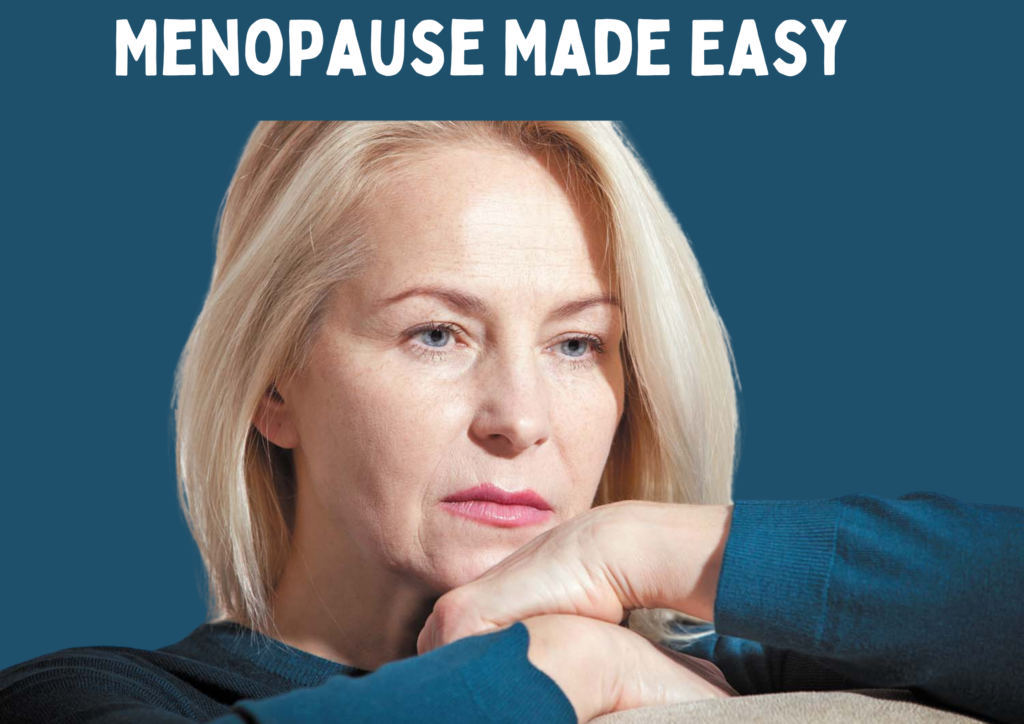
Menopause Made Easy: Simple Strategies for a Smooth Transition
 Menopause. It’s a word that can conjure up images of hot flashes, night sweats, and emotional upheaval. But what if we told you it doesn’t have to be that way? Menopause is a natural transition, marking the end of your fertile years. It’s a chance to embrace a new chapter in your life, one filled with wisdom, strength, and a newfound appreciation for your well-being.
Menopause. It’s a word that can conjure up images of hot flashes, night sweats, and emotional upheaval. But what if we told you it doesn’t have to be that way? Menopause is a natural transition, marking the end of your fertile years. It’s a chance to embrace a new chapter in your life, one filled with wisdom, strength, and a newfound appreciation for your well-being.
This comprehensive guide will equip you with the knowledge and tools you need to navigate menopause with grace and ease. We’ll delve into the science behind menopause, explore natural strategies to manage your symptoms and empower you to embrace this transformative phase with confidence.
Understanding Menopause
Menopause is defined as the permanent cessation of menstruation that occurs when your ovaries stop producing eggs. It typically happens between the ages of 45 and 55, but the timing can vary for each woman. As estrogen and progesterone production decline, you may experience a range of physical and emotional changes.
Here are some of the most common symptoms:
- Hot flashes and night sweats
- Vaginal dryness and discomfort
- Irregular sleep patterns
- Mood swings, anxiety, and depression
- Difficulty concentrating
- Reduced sex drive
- Changes in body weight and shape
Dietary Changes for a Balanced Menopause
What you eat plays a crucial role in managing your symptoms and overall health during menopause. Let’s explore some dietary strategies to optimize your well-being:
Embrace these Superfoods:
- Fruits and Vegetables: They’re brimming with antioxidants and phytoestrogens, plant-based compounds that mimic weak estrogenic effects, potentially helping ease hot flashes.
- Whole Grains: Opt for brown rice, quinoa, and whole-wheat bread for sustained energy and healthy digestion.
- Lean Protein: For satiety and muscle health, include fish, chicken, legumes, and nuts in your diet.
- Healthy Fats: To reduce inflammation and support heart health, incorporate olive oil, avocado, and fatty fish rich in omega-3s.
Foods to Limit:
- Refined Carbohydrates: Sugary drinks, white bread, and pastries can trigger blood sugar fluctuations, worsening mood swings.
- Spicy Foods: While not a universal trigger, spicy foods can exacerbate hot flashes for some women.
- Caffeine and Alcohol: These substances can disrupt sleep patterns and potentially worsen hot flashes.
Physical Activity and Menopause: Move Your Body, Feel Your Best
Regular exercise is a powerful tool for managing menopause symptoms and promoting overall health. Here’s why staying active is crucial:
- Exercise helps regulate body weight: Maintaining a healthy weight can alleviate hot flashes and joint pain.
- Physical activity boosts mood and reduces anxiety: Exercise releases endorphins, natural mood elevators that combat stress and emotional fluctuations.
- Strength training helps maintain bone health: Menopause increases the risk of osteoporosis, and weight-bearing exercises are essential for building strong bones.
Suitable exercises for menopause include:
- Brisk walking, running, or swimming for cardiovascular health.
- Strength training with weights or resistance bands to build muscle mass.
- Yoga or Pilates for improved flexibility and stress reduction.
Dealing with Emotional Changes During Menopause
Fluctuations in hormones can affect your emotional well-being. Here are some tips to navigate the emotional rollercoaster of menopause:
- Acknowledge your feelings: Don’t bottle up your emotions. Talk to a trusted friend, family member, or therapist if needed.
- Prioritize sleep: Aim for 7-8 hours of quality sleep each night. Regular sleep patterns contribute to emotional stability.
- Practice relaxation techniques: Deep breathing exercises, meditation, and yoga can help manage stress and anxiety.
- Connect with loved ones: Maintain strong social connections. Supportive relationships can make a world of difference in emotional well-being.
Natural Remedies and Supplements: A Gentle Approach
Several natural remedies and supplements may offer additional support during menopause. However, it’s crucial to speak to your doctor before incorporating any new supplement into your routine:
- Black Cohosh: This herb has shown some promise in reducing hot flashes, although research is ongoing.
- Evening Primrose Oil: It may help alleviate vaginal dryness and discomfort.
- Flaxseed: Rich in lignans, which have mild estrogen-like properties, flaxseed may offer some relief from symptoms.
Other Important Lifestyle Changes for a Smooth Transition
- Prioritize Sleep: A good night’s rest is crucial for managing mood swings and overall health. Establish a relaxing bedtime routine and create a sleep-conducive environment.
- Manage Stress: Chronic stress can exacerbate menopause symptoms. Practice relaxation techniques like deep breathing or meditation to manage stress effectively.
Conclusion
Menopause is not a disease but a natural transition. By embracing a healthy lifestyle and incorporating the strategies outlined above,you can navigate this phase gracefully. Remember, you’re not alone in this journey. Millions of women have transitioned through menopause and emerged stronger, healthier, and more empowered.
Embrace this new chapter as an opportunity for growth and self-discovery. Focus on activities that bring you joy, nurture your relationships, and prioritize your well-being. With the right approach, menopause can be a time of profound transformation, paving the way for a vibrant and fulfilling future.
FAQs
Q.Is hormone replacement therapy (HRT) an option?
HRT can be an effective treatment for some women,
but it’s not right for everyone. Discuss the pros and cons with your doctor to
determine if it’s the right choice for you.
Q. What if my symptoms are severe?
Don’t hesitate to
seek professional support. Your doctor can help you manage your symptoms and
develop a personalized treatment plan.
Q. Will my sex life change after menopause?
Menopause can affect your sex drive, but it doesn’t have to spell the end of a fulfilling sex life. Open communication with your partner, exploring lubricants, and trying new positions can all contribute to a satisfying sexual experience.Table of Contents
SEARCH HERE
CATEGORIES
RECENT POSTS



Advanced Mitochondrial Formula 2025: Can It Truly Recharge Your Energy Levels?

The Truth About Aquaponics 4 You (2025): Does It Actually Work?




Hepato Burn Supplement Review: What You Need to Know Before Buying



“The Ultimate Guide to Papillex: Natural Immune Support for HPV Relief”



Slim Down Naturally: The Truth About Plant-Based Fat Burner That Actually Work

TedsWoodworking Review 2025: Is It Worth It for Your DIY Projects?




“Immunotherapy vs. Chemotherapy: A New Era in Cancer Treatment”





“The Ultimate Guide to Hyperpigmentation Laser Treatment in 2025”


Is UV 7 Good for Tanning? What You Need to Know Before You Glow


Planning a Trip from New Windsor to Grand Canyon? Here’s What to Know

